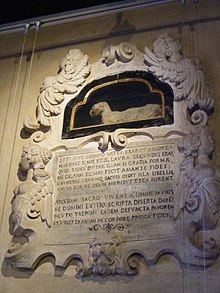Antonio Querenghi
While Marco followed Gaspare in diocesan service, Antonio was sent to the University of Padua, graduating with a degree in both canon and civil law in 1571 and in theology in 1573.
[1] Querenghi was a disciple of Sperone Speroni and had ties of friendship with Torquato Tasso, Jacopo Mazzoni and Paolo Beni.
In 1592, he attached himself to the private academy of Cardinal Cinzio Aldobrandini, whose members included Tasso and Francesco Patrizi, who had written Querenghi into his dialogue L'amorosa filosofia in 1577.
In 1607, in cooperation with Caspar Schoppe, he sought to reconcile Paul V with Paolo Sarpi and Tommaso Campanella, who wrote him a letter of gratitude from prison.
That year, Vincenzo Gramigna [it] published a dialogue inspired by him, entitled Il Querenghi, overo della generosità.
In 1568, he contributed three songs (carmina) and a sonnet to the Tempio, an anthology published at Padua in honour of Geronima Colonna d'Aragona by Lorenzo Pasquato [it].
[1] In 1579, one of his Sapphic odes, Ad naturam, was included in an appendix to Alessandro Carriero's Possint ne arte simplicia veraque metalla gigni.
His Belgica historia, an account of the exploits of Ranuccio's father, Alessandro Farnese, in the Eighty Years' War, was never finished.
[1] Querenghi wrote a humorous epitaph in Latin verse for Petrarch's cat in the Casa del Petrarca [it] in Arquà.
His vernacular poetry collection Poesie volgari was published five times during his life (Modena, 1616; Rome, 1616 and 1621; Padua, 1622; Venice, 1626).
[5] Querenghi wrote a panegyric of Prince Władysław Vasa, Carmen ad Urbem Romam in adventu Serenissimi Vladislai Poloniae Principis.

